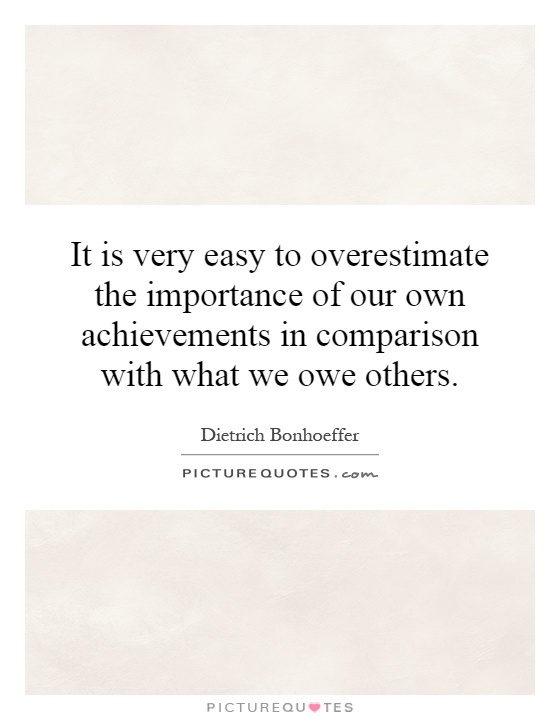It is very easy to overestimate the importance of our own achievements in comparison with what we owe others

It is very easy to overestimate the importance of our own achievements in comparison with what we owe others
Dietrich Bonhoeffer, a German theologian and pastor who actively opposed the Nazi regime during World War II, is a prime example of someone who understood the importance of humility and recognizing the contributions of others. Bonhoeffer's life and work serve as a powerful reminder that it is very easy to overestimate the importance of our own achievements in comparison with what we owe others.Bonhoeffer's commitment to social justice and his unwavering faith in the face of adversity are well-documented. However, he never sought to elevate himself above others or take credit for his accomplishments. Instead, he consistently acknowledged the support and guidance he received from his colleagues, friends, and mentors. Bonhoeffer understood that his work was part of a larger collective effort to combat injustice and promote peace.
In his writings, Bonhoeffer often emphasized the importance of community and the interconnectedness of all individuals. He believed that true fulfillment could only be achieved through meaningful relationships with others and a sense of shared responsibility for the well-being of society. Bonhoeffer's philosophy was rooted in the idea that we are all interconnected and that our actions have a ripple effect on those around us.
Bonhoeffer's humility and recognition of the contributions of others were evident in his interactions with his fellow resistance members and his willingness to listen to different perspectives. He understood that true progress could only be made through collaboration and cooperation, rather than individual achievement. Bonhoeffer's commitment to serving others and his willingness to sacrifice his own comfort and safety for the greater good are a testament to his humility and selflessness.












 Friendship Quotes
Friendship Quotes Love Quotes
Love Quotes Life Quotes
Life Quotes Funny Quotes
Funny Quotes Motivational Quotes
Motivational Quotes Inspirational Quotes
Inspirational Quotes